2018初中英语写作之城市和乡村生活的区别
- 格式:doc
- 大小:23.50 KB
- 文档页数:2

七年级英语作文城市和农村的区别The Contrasting Lifestyles of City and Rural LivingLiving in a city or in a rural area can present vastly different experiences and challenges. From the pace of life to the availability of resources, the choice between an urban or rural setting can significantly impact one's daily routine and overall quality of life. While both environments offer unique advantages, the distinctions between city and rural living are quite pronounced.One of the most notable differences lies in the population density. Cities are characterized by a high concentration of people residing in a relatively small geographical area. This density can contribute to a faster-paced lifestyle, as individuals often need to navigate through crowded streets, public transportation, and a multitude of commercial and entertainment options. In contrast, rural areas typically have a much lower population density, allowing for a more leisurely and serene pace of life. The open spaces and reduced traffic in rural settings can foster a greater sense of tranquility and connection with the natural environment.The availability and accessibility of amenities also vary greatly between city and rural living. Cities generally offer a wider array of services, such as healthcare facilities, educational institutions, shopping centers, and a diverse range of entertainment options. These resources are often more readily available and conveniently located within the city limits, catering to the needs of the dense population. Rural areas, on the other hand, may have limited access to certain amenities, requiring residents to travel longer distances to access essential services. This can be particularly challenging for those who lack reliable transportation or live in remote locations.The economic opportunities available in cities and rural areas also differ significantly. Urban centers tend to have a more diverse and dynamic job market, with a wide range of industries and employment possibilities. This can provide individuals with more career options and opportunities for professional growth and advancement. Conversely, rural economies are often more reliant on traditional industries, such as agriculture, mining, or tourism, which may offer fewer job prospects, especially in highly specialized fields. However, rural areas can provide a lower cost of living, which can be attractive for those seeking a more affordable lifestyle.The infrastructure and transportation systems in cities and rural areas also present distinct differences. Cities typically boast well-developedtransportation networks, including extensive public transit systems, highways, and often, advanced rail or subway systems. This infrastructure facilitates the movement of people and goods, enabling efficient commuting and connectivity. In contrast, rural areas tend to have more limited transportation options, with a greater reliance on personal vehicles or limited public transportation. This can pose challenges for those without access to reliable transportation, particularly for accessing essential services or maintaining social connections.The cultural and social dynamics in cities and rural areas also differ significantly. Urban centers often foster a more diverse and cosmopolitan atmosphere, with a wide range of cultural events, entertainment options, and exposure to different backgrounds and perspectives. This can lead to a more vibrant and stimulating social environment, but it may also contribute to a sense of anonymity or isolation for some individuals. Rural areas, on the other hand, tend to have a stronger sense of community and close-knit social networks, where residents often know their neighbors and participate in local events and activities. This can provide a greater sense of belonging and support, but it may also result in a more insular and potentially less diverse social circle.The environmental considerations between city and rural living are also noteworthy. Cities are typically associated with higher levels ofpollution, noise, and environmental degradation due to the concentration of human activity and infrastructure. This can have negative impacts on air quality, water resources, and overall ecological balance. Rural areas, in contrast, often boast a more pristine natural environment, with cleaner air, less noise pollution, and a greater abundance of green spaces and wildlife habitats. However, rural residents may face different environmental challenges, such as limited access to modern waste management systems or the need to rely on alternative energy sources like generators or wood-burning stoves.In conclusion, the choice between city and rural living involves a complex set of trade-offs and considerations. While cities offer a more diverse array of amenities, economic opportunities, and cultural stimulation, rural areas can provide a slower pace of life, a stronger sense of community, and a more harmonious relationship with the natural environment. Ultimately, the decision to reside in a city or a rural area will depend on an individual's personal preferences, lifestyle needs, and the specific priorities that they value most.。
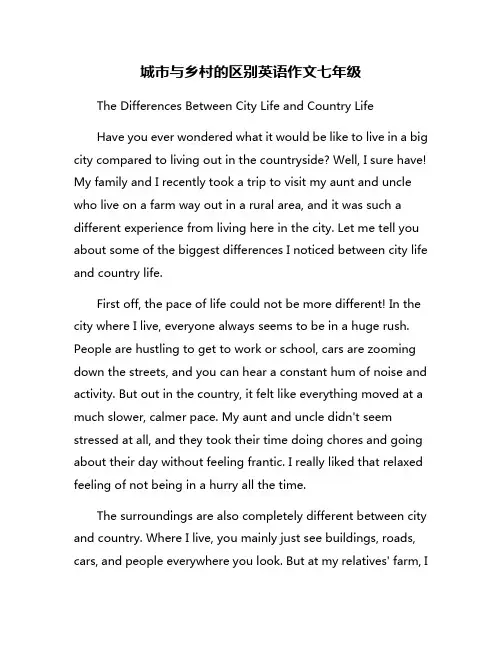
城市与乡村的区别英语作文七年级The Differences Between City Life and Country LifeHave you ever wondered what it would be like to live in a big city compared to living out in the countryside? Well, I sure have! My family and I recently took a trip to visit my aunt and uncle who live on a farm way out in a rural area, and it was such a different experience from living here in the city. Let me tell you about some of the biggest differences I noticed between city life and country life.First off, the pace of life could not be more different! In the city where I live, everyone always seems to be in a huge rush. People are hustling to get to work or school, cars are zooming down the streets, and you can hear a constant hum of noise and activity. But out in the country, it felt like everything moved at a much slower, calmer pace. My aunt and uncle didn't seem stressed at all, and they took their time doing chores and going about their day without feeling frantic. I really liked that relaxed feeling of not being in a hurry all the time.The surroundings are also completely different between city and country. Where I live, you mainly just see buildings, roads, cars, and people everywhere you look. But at my relatives' farm, Iwas surrounded by wide open spaces, fields, trees, and beautiful natural scenery. Breathing in that fresh country air was amazing compared to the exhaust and pollution of the city. I loved looking up at a sky full of bright stars at night without all the light pollution blocking the view. And being around all the cows, chickens, and other farm animals was such a fun novelty!Getting around is another big difference. In the city, you can usually just walk, bike, take the bus or subway to get where you need to go without too much difficulty. Everything is condensed and close together. But in the country, a lot of driving is often required since things are so spread out and far apart. My aunt and uncle had to drive 20-30 minutes just to get to the closest town for many things. That amount of driving every day would be really inconvenient compared to city living.One aspect I think I might have enjoyed more in the country is having more independence and freedom. In the city, my parents are always worried about me going places alone because of the higher risks of crime, getting lost, getting into trouble without supervision, and other dangers. But out in the middle of nowhere on the farm, my aunt and uncle were totally comfortable letting me roam around the land and do my ownthing without hovering over me. That level of trust and independence was pretty nice for a 7th grader like me!All in all, visiting the country was a fun change of pace from my regular city life, and I'm glad I got to experience both environments. But when it comes down to it, I think I still prefer living in the city for the most part. I like having so many conveniences at my fingertips - restaurants, shopping, activities, public transportation, and just being walking distance to my friends' houses. The non-stop excitement and energy of the city is what I'm used to. As much as I enjoyed the slower pace and natural scenery of the country for a short visit, I think the lack of amenities and constantly having to drive everywhere would start to bother me after a while if I lived there permanently.For now, I'll happily take my city life! But I'm so grateful I got to see what living in a rural area was like with my aunt and uncle. It really opened my eyes to how different lifestyles can be in contrasting environments like cities and the countryside. I feel very lucky that I got to experience the best of both worlds this year.。
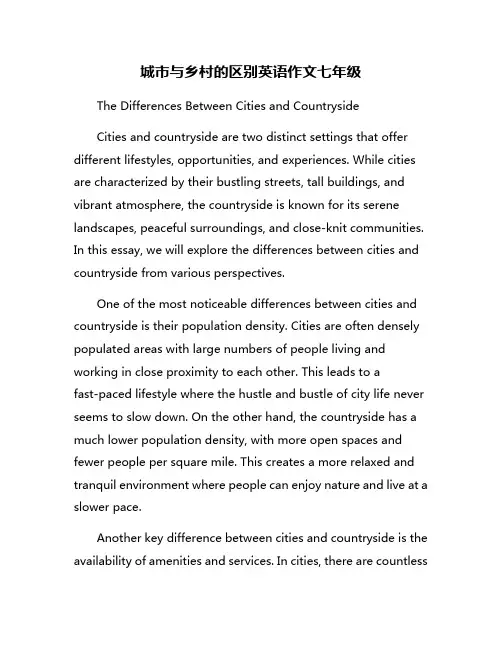
城市与乡村的区别英语作文七年级The Differences Between Cities and CountrysideCities and countryside are two distinct settings that offer different lifestyles, opportunities, and experiences. While cities are characterized by their bustling streets, tall buildings, and vibrant atmosphere, the countryside is known for its serene landscapes, peaceful surroundings, and close-knit communities. In this essay, we will explore the differences between cities and countryside from various perspectives.One of the most noticeable differences between cities and countryside is their population density. Cities are often densely populated areas with large numbers of people living and working in close proximity to each other. This leads to afast-paced lifestyle where the hustle and bustle of city life never seems to slow down. On the other hand, the countryside has a much lower population density, with more open spaces and fewer people per square mile. This creates a more relaxed and tranquil environment where people can enjoy nature and live at a slower pace.Another key difference between cities and countryside is the availability of amenities and services. In cities, there are countlessrestaurants, shops, entertainment venues, and cultural attractions to choose from. The availability of public transportation also makes it easy to get around the city and explore different neighborhoods. In contrast, the countryside may have fewer amenities and services, with fewer options for dining, shopping, and entertainment. This can make it more challenging for residents in rural areas to access the same level of convenience and variety that city dwellers enjoy.Infrastructure is another important distinction between cities and countryside. Cities are often well-developed with modern infrastructure such as roads, bridges, public transportation systems, and high-speed internet access. This makes it easier for residents to travel, commute, and communicate with each other. In contrast, the countryside may have limited infrastructure, especially in remote or isolated areas. This can make it more difficult for residents in rural areas to access essential services like healthcare, education, and job opportunities.Cultural differences also set cities and countryside apart. Cities are cultural melting pots where people from diverse backgrounds come together to create a rich tapestry of traditions, languages, and customs. This diversity is reflected in the city's architecture, cuisine, festivals, and arts scene. Incontrast, the countryside often has a more homogeneous culture with strong ties to the land, nature, and rural traditions. Residents in rural areas may have a stronger sense of community and belonging, with shared values and beliefs that are passed down through generations.In terms of economic opportunities, cities are often seen as hubs of innovation, entrepreneurship, and industry. They attract businesses, investors, and workers looking for job opportunities, career advancement, and economic growth. The presence of major corporations, financial institutions, and technology companies in cities can create a dynamic economy with diverse employment options. In contrast, the countryside may have fewer job opportunities and industries, especially in traditional rural sectors like agriculture, forestry, and mining. This can lead to economic challenges such as unemployment, poverty, and limited access to resources in rural areas.Despite their differences, both cities and countryside have their own unique charms and advantages. Cities offer a vibrant urban lifestyle with exciting opportunities for work, entertainment, and socializing. They are cultural hubs where people can experience a diverse range of art, music, cuisine, and traditions. In contrast, the countryside offers a peaceful andidyllic setting where residents can enjoy the beauty of nature, fresh air, and a slower pace of life. Rural areas provide a sense of community, connection to the land, and the opportunity to live closer to nature.In conclusion, the differences between cities and countryside are evident in their population density, amenities, infrastructure, culture, economic opportunities, and lifestyle. While cities offer a fast-paced urban environment with numerous benefits and conveniences, the countryside provides a peaceful and serene setting with its own unique charms. Whether one prefers the excitement of city life or the tranquility of rural living, both cities and countryside have something special to offer. Ultimately, the choice between city and countryside living comes down to personal preference, lifestyle priorities, and individual needs.。
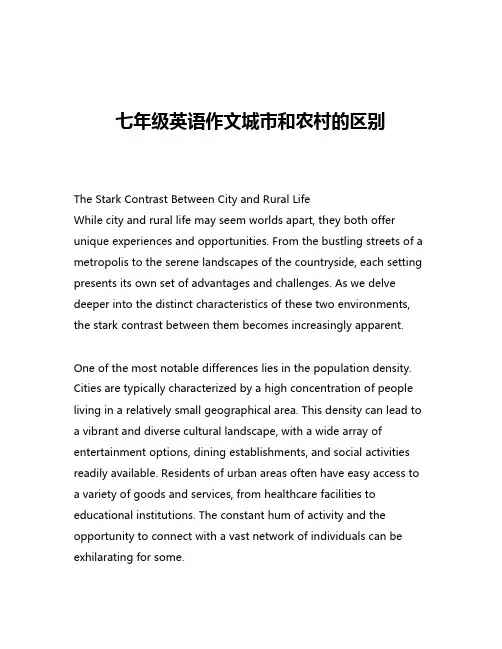
七年级英语作文城市和农村的区别The Stark Contrast Between City and Rural LifeWhile city and rural life may seem worlds apart, they both offer unique experiences and opportunities. From the bustling streets of a metropolis to the serene landscapes of the countryside, each setting presents its own set of advantages and challenges. As we delve deeper into the distinct characteristics of these two environments, the stark contrast between them becomes increasingly apparent.One of the most notable differences lies in the population density. Cities are typically characterized by a high concentration of people living in a relatively small geographical area. This density can lead to a vibrant and diverse cultural landscape, with a wide array of entertainment options, dining establishments, and social activities readily available. Residents of urban areas often have easy access to a variety of goods and services, from healthcare facilities to educational institutions. The constant hum of activity and the opportunity to connect with a vast network of individuals can be exhilarating for some.In contrast, rural areas are generally marked by a lower population density, with residents spread out across larger expanses of land. This sparsity can create a sense of tranquility and solitude, offering a respite from the fast-paced and sometimes overwhelming nature of city life. Rural dwellers often enjoy a closer connection to nature, with opportunities to engage in outdoor pursuits such as hiking, fishing, and gardening. The pace of life in rural areas tends to be slower, allowing for a greater emphasis on personal relationships and community-based activities.Another significant distinction between city and rural life is the availability and accessibility of infrastructure. Cities typically boast an extensive network of public transportation options, including buses, subways, and commuter rail systems. This infrastructure allows residents to navigate the urban landscape with relative ease, reducing the reliance on personal vehicles. In contrast, rural areas often have limited public transportation, requiring residents to rely more heavily on personal vehicles for their daily commutes and errands.The diversity of employment opportunities also sets city and rural life apart. Cities are often hubs of economic activity, offering a wide range of job options across various industries, from finance and technology to healthcare and the arts. This diversity can provide more opportunities for career advancement and professionaldevelopment. Rural areas, on the other hand, may have a more limited job market, often centered around industries such as agriculture, manufacturing, or tourism. While the pace of life may be slower in rural areas, the job options may be more specialized and closely tied to the unique characteristics of the local community.The availability and quality of educational institutions also differ significantly between city and rural settings. Urban areas typically boast a greater concentration of universities, colleges, and specialized schools, providing residents with a broader range of educational choices and resources. Rural areas, while often offering smaller, community-based schools, may have fewer options for post-secondary education, requiring students to commute or relocate to pursue advanced degrees.The cultural landscape also varies greatly between city and rural life. Cities are often hubs of artistic expression, hosting a diverse array of cultural events, such as concerts, theater performances, and art exhibitions. Urban areas may also provide greater access to diverse cuisines, reflecting the multicultural nature of the population. In contrast, rural communities may have a stronger focus on local traditions, festivals, and community-based cultural activities, often deeply rooted in the region's history and natural environment.Access to healthcare services is another key distinction between cityand rural life. Urban areas generally have a higher concentration of healthcare facilities, including hospitals, specialized clinics, and a wider range of medical specialists. This can provide city dwellers with more options and potentially shorter wait times for healthcare services. Rural areas, however, may face challenges in accessing comprehensive healthcare, often requiring residents to travel longer distances to reach medical facilities.Finally, the cost of living is a significant factor that sets city and rural life apart. Urban areas are often associated with a higher cost of living, particularly in terms of housing, utilities, and the general cost of goods and services. The demand for limited space in cities can drive up real estate prices, making it more challenging for residents to afford comfortable living accommodations. In contrast, rural areas typically have a lower cost of living, with more affordable housing options and a generally lower price tag on everyday expenses.In conclusion, the differences between city and rural life are multifaceted and far-reaching. While cities offer the convenience of a diverse array of amenities, employment opportunities, and cultural experiences, rural areas provide a more serene and close-knit lifestyle, often with a stronger connection to the natural environment. Ultimately, the choice between city and rural life comes down to personal preferences, priorities, and the unique needs and circumstances of each individual.。
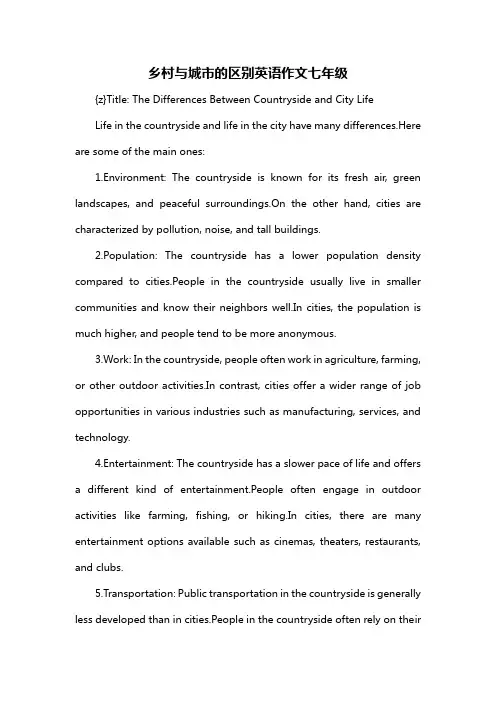
乡村与城市的区别英语作文七年级{z}Title: The Differences Between Countryside and City LifeLife in the countryside and life in the city have many differences.Here are some of the main ones:1.Environment: The countryside is known for its fresh air, green landscapes, and peaceful surroundings.On the other hand, cities are characterized by pollution, noise, and tall buildings.2.Population: The countryside has a lower population density compared to cities.People in the countryside usually live in smaller communities and know their neighbors well.In cities, the population is much higher, and people tend to be more anonymous.3.Work: In the countryside, people often work in agriculture, farming, or other outdoor activities.In contrast, cities offer a wider range of job opportunities in various industries such as manufacturing, services, and technology.4.Entertainment: The countryside has a slower pace of life and offersa different kind of entertainment.People often engage in outdoor activities like farming, fishing, or hiking.In cities, there are many entertainment options available such as cinemas, theaters, restaurants, and clubs.5.Transportation: Public transportation in the countryside is generally less developed than in cities.People in the countryside often rely on theircars or other vehicles for transportation.In cities, there are usually efficient public transportation systems including buses, subways, and trains.cation: Cities usually have more educational opportunities, including universities, colleges, and research institutions.The countryside may have fewer schools and educational resources.In conclusion, the countryside and the city have their own unique charms and advantages.People may choose to live in either depending on their preferences and needs.。
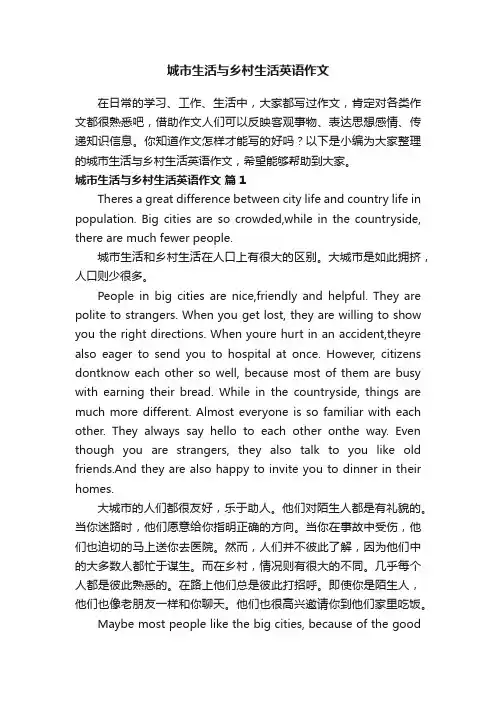
城市生活与乡村生活英语作文在日常的学习、工作、生活中,大家都写过作文,肯定对各类作文都很熟悉吧,借助作文人们可以反映客观事物、表达思想感情、传递知识信息。
你知道作文怎样才能写的好吗?以下是小编为大家整理的城市生活与乡村生活英语作文,希望能够帮助到大家。
城市生活与乡村生活英语作文篇1Theres a great difference between city life and country life in population. Big cities are so crowded,while in the countryside, there are much fewer people.城市生活和乡村生活在人口上有很大的区别。
大城市是如此拥挤,人口则少很多。
People in big cities are nice,friendly and helpful. They are polite to strangers. When you get lost, they are willing to show you the right directions. When youre hurt in an accident,theyre also eager to send you to hospital at once. However, citizens dontknow each other so well, because most of them are busy with earning their bread. While in the countryside, things are much more different. Almost everyone is so familiar with each other. They always say hello to each other onthe way. Even though you are strangers, they also talk to you like old friends.And they are also happy to invite you to dinner in their homes.大城市的人们都很友好,乐于助人。
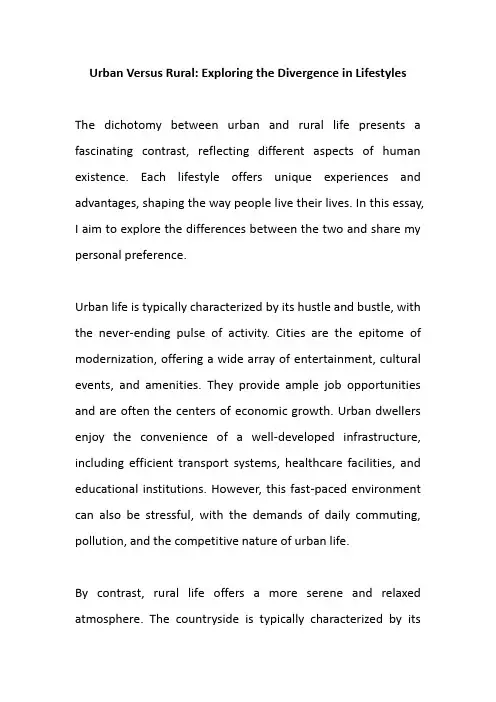
Urban Versus Rural: Exploring the Divergence in LifestylesThe dichotomy between urban and rural life presents a fascinating contrast, reflecting different aspects of human existence. Each lifestyle offers unique experiences and advantages, shaping the way people live their lives. In this essay, I aim to explore the differences between the two and share my personal preference.Urban life is typically characterized by its hustle and bustle, with the never-ending pulse of activity. Cities are the epitome of modernization, offering a wide array of entertainment, cultural events, and amenities. They provide ample job opportunities and are often the centers of economic growth. Urban dwellers enjoy the convenience of a well-developed infrastructure, including efficient transport systems, healthcare facilities, and educational institutions. However, this fast-paced environment can also be stressful, with the demands of daily commuting, pollution, and the competitive nature of urban life.By contrast, rural life offers a more serene and relaxed atmosphere. The countryside is typically characterized by itsnatural beauty, with vast tracts of farmland, forests, and lakes. Residents enjoy the peace and quiet, far removed from the hustle and bustle of the city. Rural areas often boast cleaner air and a slower pace of life, allowing individuals to connect more deeply with nature and appreciate its wonders. Moreover, rural communities often have a strong sense of community spirit, with neighbors helping each other and supporting local businesses. However, rural life can also be challenging, with limited job opportunities and infrastructure, as well as the isolation and lack of cultural activities.Personally, I have a strong preference for urban life. The allure of the city lies in its diversity and opportunities. I am drawn to the energy and excitement of the urban landscape, with the constant flow of people, ideas, and cultures. The city provides me with a rich cultural experience, as well as the chance to pursue my passions and ambitions. However, I also cherish the visits to the countryside, where I can escape the hustle and bustle and reconnect with nature.In conclusion, the divide between urban and rural life is multifaceted, reflecting different values and lifestyles. Whileboth offer unique experiences and advantages, the choice ultimately depends on individual preferences and needs. For me, the city remains a fascinating and vibrant setting, but the countryside also holds a special place in my heart.。
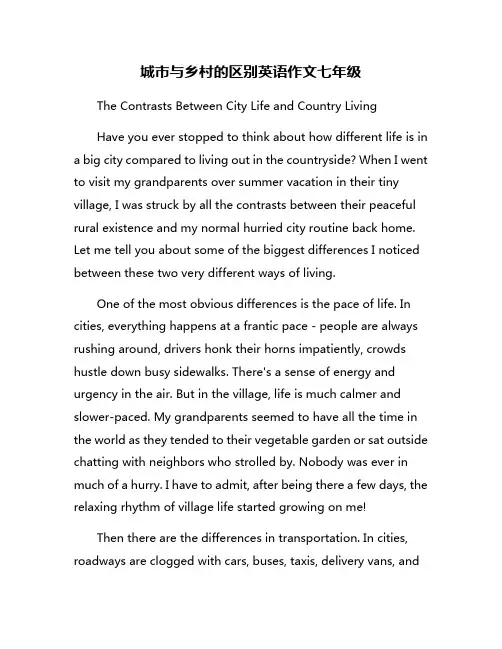
城市与乡村的区别英语作文七年级The Contrasts Between City Life and Country LivingHave you ever stopped to think about how different life is in a big city compared to living out in the countryside? When I went to visit my grandparents over summer vacation in their tiny village, I was struck by all the contrasts between their peaceful rural existence and my normal hurried city routine back home. Let me tell you about some of the biggest differences I noticed between these two very different ways of living.One of the most obvious differences is the pace of life. In cities, everything happens at a frantic pace - people are always rushing around, drivers honk their horns impatiently, crowds hustle down busy sidewalks. There's a sense of energy and urgency in the air. But in the village, life is much calmer and slower-paced. My grandparents seemed to have all the time in the world as they tended to their vegetable garden or sat outside chatting with neighbors who strolled by. Nobody was ever in much of a hurry. I have to admit, after being there a few days, the relaxing rhythm of village life started growing on me!Then there are the differences in transportation. In cities, roadways are clogged with cars, buses, taxis, delivery vans, andbicycles engaged in a chaotic dance of traffic. But in the village, most folks either walked everywhere or used a bicycle. My grandparents didn't even own a car! The only vehicles I really noticed were the occasional tractor rumbling down the road. Getting around was so much quieter and easier without all the noise and congestion of city traffic.You can definitely tell the difference in terms of population density too. Cities are absolutely packed with high-rise apartment buildings, office towers, and residential neighborhoods crammed together. Wherever you go, you're surrounded by crowds and masses of other people. The village, in contrast, just had a smattering of houses and shops scattered among the farms and open spaces. You could actually hear the chirping of birds and rustling of trees instead of all thehuman-made clamor.The job opportunities vary widely as well. In cities, there are offices, restaurants, stores, factories, and all manner of workplaces representing a huge variety of career paths. But in the village, most of the employment revolved around agriculture or running small businesses catering to the local residents. My grandfather spent his whole life farming the same fields his father had. That consistency was unheard of back in the citywhere I saw friends' parents frequently changing jobs and careers.Even the types of entertainment differ greatly. For fun in the city, we go to movies, museums, concerts, theme parks, shopping malls, and other businesses geared towards leisure and amusement. But village recreation seemed to center more around simple pleasures and homemade fun. My grandparents enjoyed gardening, fishing, cooking, and getting together with neighbors to play cards or board games. At night, folks would socialize outside and stargaze since there was no light pollution like back home.You'd also find very different styles of food available. City restaurants and grocery stores have cuisines from all over the world at your fingertips - Chinese, Mexican, Italian, Indian, and many more. There are also tons of processed, pre-packaged items and fast food places. The village, however, tended to feature homegrown and locally-sourced foods with more basic, traditional recipes. Baked goods were made from scratch, fruits and vegetables came fresh from the crop fields, and preparing meals focused on simple but hearty country-style dishes.Even the physical surroundings differed immensely. Cities are all about human-made structures - skyscrapers, paved roads,urban parks carefully curated and manicured. The village, in contrast, was dominated by wide open fields, rolling hills, trees, rivers, and other natural landscapes. My grandparents' backyard had a forest, a creek, and an endless horizon stretching into the distance. Communing with nature and greenery was just a fact of life there.One of the most charming differences was the sense of community and connectedness in the village. Because it was such a small, tight-knit population, it seemed like everyone knew each other and looked out for one another. Neighbors helped with chores, shared meals, and celebrated occasions together like one big happy family. In the city, people tend to keep more to themselves and have a smaller circle of close-knit connections beyond their immediate families. Sometimes the feeling of anonymity in a city can make you feel isolated and alone in a crowd. The village had a warmth and communal spirit I don't typically experience back home.At the same time, I can't deny that village life also felt a bit...boring and repetitive after a while. The absence of variety and fresh stimuli started to make me antsy to return to the dynamism and nonstop action of the city. The trade-off for the peacefulness of country living seemed to be a certain level ofmonotony and lack of surprises. While my grandparents found contentment in their steady routines, I started to miss the constant buzz of new experiences and excitement that cities provide.So in the end, both city and village life have their pros and cons that make them wildly different environments to live in. Cities offer variety, opportunity, and endless discoverable corners - but also congestion, noise, isolation, and a frenetic pace. Villages provide tranquility, strong communities,self-sufficiency, and closeness to nature - but also potential dullness, fewer options, and a relatively static existence. I can appreciate the charms of each way of living and the appeals they both hold.After getting a taste of the contrasts between these two worlds, I have a newfound respect for the different values and trade-offs inherent to city versus country life. And I've realized how fortunate I am to have gotten this glimpse into another side of the human experience so unlike my normal day-to-day routine. It has helped expand my perspective and given me a lot to ponder about the many ways our diverse world has to offer for how we make our home on this planet.。
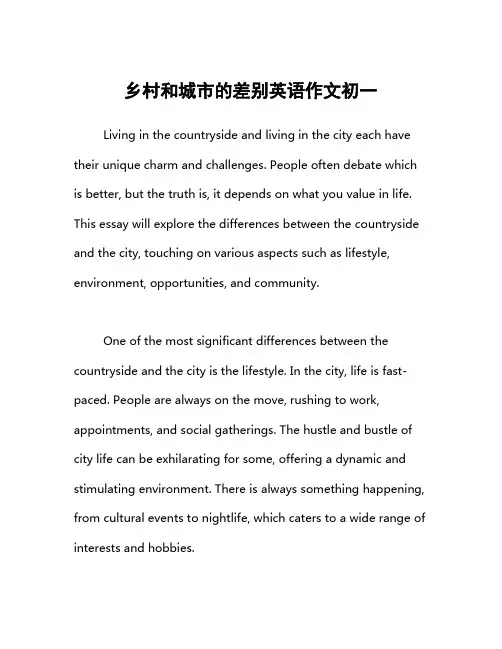
乡村和城市的差别英语作文初一Living in the countryside and living in the city each have their unique charm and challenges. People often debate which is better, but the truth is, it depends on what you value in life. This essay will explore the differences between the countryside and the city, touching on various aspects such as lifestyle, environment, opportunities, and community.One of the most significant differences between the countryside and the city is the lifestyle. In the city, life is fast-paced. People are always on the move, rushing to work, appointments, and social gatherings. The hustle and bustle of city life can be exhilarating for some, offering a dynamic and stimulating environment. There is always something happening, from cultural events to nightlife, which caters to a wide range of interests and hobbies.In contrast, the countryside offers a slower, more relaxed way of life. Days are often spent outdoors, enjoying nature and engaging in agricultural activities. The pace of life allows for more leisure time and a closer connection to the natural world. This slower pace can be a welcome change for those who find city life stressful and overwhelming.The environment in the countryside and the city is starkly different. Cities are characterized by their tall buildings, busy streets, and a constant hum of activity. They are often filled with pollution from vehicles and industries, leading to poorer air quality. However, cities also offer beautiful parks, modern architecture, and a sense of grandeur that is hard to find elsewhere.On the other hand, the countryside is known for its natural beauty. Expansive fields, forests, rivers, and mountains dominate the landscape. The air is cleaner, and the surroundings are quieter, allowing residents to enjoy the sounds of nature. Thisconnection to the environment can lead to a healthier and more fulfilling life, as people have more opportunities to engage in outdoor activities and enjoy the tranquility of their surroundings.When it comes to opportunities, cities generally have the upper hand. They are hubs of economic activity, offering a wide range of jobs in various industries. Cities are home to numerous businesses, educational institutions, and healthcare facilities, providing residents with better career prospects, educational opportunities, and access to top-notch medical care. The concentration of services and amenities makes city living convenient and efficient.In contrast, the countryside may offer fewer job opportunities and services. Employment is often centered around agriculture, small businesses, and tourism. However, the rise of remote work and digital technologies has begun to bridge this gap, allowing people to work from anywhere. While educational and healthcare facilities might be less advanced oraccessible, the sense of community often makes up for these shortcomings, with neighbors frequently stepping in to support one another.The sense of community is another area where the countryside and the city differ significantly. In the countryside, people often live in smaller, tight-knit communities where everyone knows each other. This close-knit environment fosters strong relationships and a sense of belonging. Neighbors are more likely to help one another, creating a supportive network that can be especially beneficial in times of need.City life, on the other hand, can be more isolating. While cities are home to millions of people, the sheer size and fast pace can make it difficult to form close relationships. People often live busy lives, with less time to interact with their neighbors. However, cities offer a diverse and multicultural environment, where individuals can meet people from all walks of life and experience different cultures and perspectives.In conclusion, the differences between the countryside and the city are profound, affecting lifestyle, environment, opportunities, and community. Each has its unique advantages and challenges. The countryside offers a peaceful, close-knit community and a deep connection to nature, while the city provides a fast-paced, opportunity-rich environment with a diverse cultural landscape. Ultimately, the choice between living in the countryside or the city depends on what an individual values most in life. Whether it’s the tranquility and beauty of the countryside or the vibrancy and opportunities of the city, both have the potential to provide a fulfilling and satisfying life.。
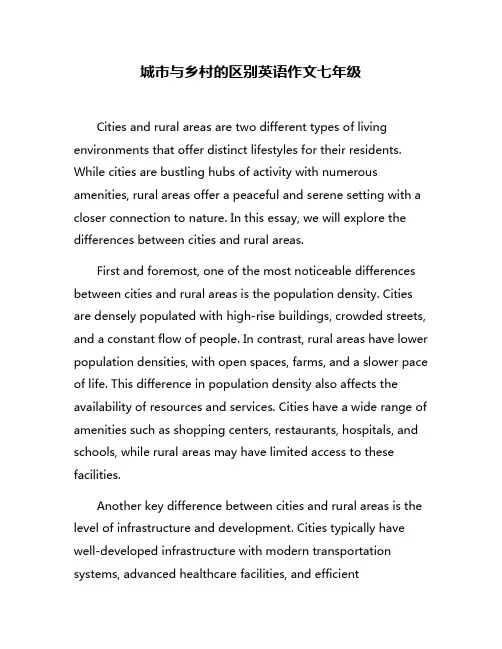
城市与乡村的区别英语作文七年级Cities and rural areas are two different types of living environments that offer distinct lifestyles for their residents. While cities are bustling hubs of activity with numerous amenities, rural areas offer a peaceful and serene setting with a closer connection to nature. In this essay, we will explore the differences between cities and rural areas.First and foremost, one of the most noticeable differences between cities and rural areas is the population density. Cities are densely populated with high-rise buildings, crowded streets, and a constant flow of people. In contrast, rural areas have lower population densities, with open spaces, farms, and a slower pace of life. This difference in population density also affects the availability of resources and services. Cities have a wide range of amenities such as shopping centers, restaurants, hospitals, and schools, while rural areas may have limited access to these facilities.Another key difference between cities and rural areas is the level of infrastructure and development. Cities typically have well-developed infrastructure with modern transportation systems, advanced healthcare facilities, and efficientcommunication networks. Rural areas, on the other hand, may have limited infrastructure, including poorly maintained roads, limited access to healthcare, and unreliable internet connection. This lack of infrastructure can make it challenging for residents of rural areas to access essential services.In terms of employment opportunities, cities offer a wider range of job opportunities in various sectors such as finance, technology, healthcare, and entertainment. The diversity of industries in cities attracts a large number of job seekers looking for career advancement and higher salaries. In contrast, rural areas may have limited job opportunities, primarily in agriculture, forestry, and small businesses. As a result, many residents of rural areas may need to commute long distances to cities for work.Furthermore, the lifestyle and culture in cities and rural areas are significantly different. Cities are known for their fast-paced lifestyle, cultural diversity, and vibrant nightlife. Residents of cities have access to a wide range of entertainment options such as theaters, museums, art galleries, and music concerts. On the other hand, rural areas offer a simpler way of life with aclose-knit community, traditional values, and a strong connection to nature. Residents of rural areas often enjoyoutdoor activities such as hiking, fishing, and camping, appreciating the natural beauty of their surroundings.In terms of education, cities typically have a higher concentration of schools, colleges, and universities, offering a wide range of educational opportunities for students. The quality of education in cities is often higher due to better-funded schools and access to experienced teachers. In contrast, rural areas may have limited educational resources, including fewer schools, inadequate facilities, and fewer extracurricular activities. This disparity in educational opportunities can impact the academic achievement and future prospects of students in rural areas.In conclusion, cities and rural areas offer distinct living environments with unique advantages and challenges. While cities provide a bustling and diverse urban experience with abundant amenities and job opportunities, rural areas offer a peaceful and close-to-nature setting with a slower pace of life. The choice between city living and rural living ultimately depends on individual preferences and priorities. Both cities and rural areas have their own charm and appeal, catering to different lifestyles and preferences.。
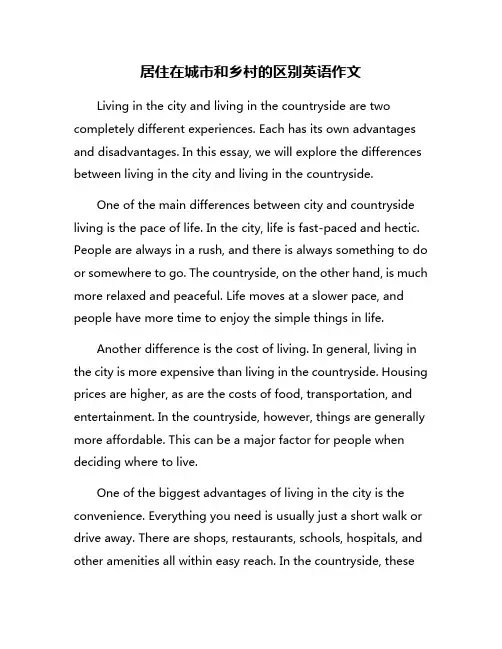
居住在城市和乡村的区别英语作文Living in the city and living in the countryside are two completely different experiences. Each has its own advantages and disadvantages. In this essay, we will explore the differences between living in the city and living in the countryside.One of the main differences between city and countryside living is the pace of life. In the city, life is fast-paced and hectic. People are always in a rush, and there is always something to do or somewhere to go. The countryside, on the other hand, is much more relaxed and peaceful. Life moves at a slower pace, and people have more time to enjoy the simple things in life.Another difference is the cost of living. In general, living in the city is more expensive than living in the countryside. Housing prices are higher, as are the costs of food, transportation, and entertainment. In the countryside, however, things are generally more affordable. This can be a major factor for people when deciding where to live.One of the biggest advantages of living in the city is the convenience. Everything you need is usually just a short walk or drive away. There are shops, restaurants, schools, hospitals, and other amenities all within easy reach. In the countryside, thesethings can be much more spread out, making it more difficult to access them.On the other hand, living in the countryside offers a closer connection to nature. There are fields, forests, and rivers to explore, and the air is cleaner and fresher. In the city, green spaces can be limited, and pollution can be a problem. For people who enjoy outdoor activities like hiking, biking, or fishing, the countryside can be a much more appealing place to live.In terms of social life, living in the city offers more opportunities to meet new people and experience different cultures. There are museums, theaters, restaurants, and other cultural attractions to enjoy. In the countryside, social activities may be more limited, but there is often a stronger sense of community and a closer-knit group of friends and neighbors.In conclusion, there are pros and cons to both city living and countryside living. The right choice for you will depend on your personal preferences, lifestyle, and priorities. Whether you prefer the hustle and bustle of city life or the peace and quiet of the countryside, it's important to consider all aspects of each before making a decision. Ultimately, both city and countryside living offer their own unique and fulfilling experiences.。
居住在城市和乡村的区别英语作文Living in the City versus Living in the Rural AreasThe decision to live in a city or a rural area is a highly personal one, and there are valid arguments on both sides. Each option offers its own unique advantages and disadvantages, and the choice ultimately depends on an individual's preferences, lifestyle, and priorities. In this essay, we will explore the key differences between living in a city and living in a rural area.One of the primary distinctions between city and rural living is the availability of amenities and services. Cities typically offer a wider range of entertainment, dining, and shopping options, as well as better access to healthcare, education, and public transportation. This can be particularly appealing for those who value convenience and a diverse range of choices. Additionally, cities often have a more vibrant cultural scene, with opportunities to attend concerts, theater performances, and art exhibitions.In contrast, rural areas tend to have a slower pace of life and a more peaceful, serene environment. The natural surroundings in rural areas can be a significant draw for those seeking a more tranquil andserene lifestyle. Rural dwellers may enjoy activities such as hiking, fishing, and gardening, which are often more accessible and affordable in these areas. Furthermore, the cost of living is generally lower in rural areas, making it a more financially viable option for some individuals.Another key difference between city and rural living is the sense of community. In rural areas, there is often a stronger sense of community, with residents tending to be more closely connected and supportive of one another. This can be particularly beneficial for families, as children may have more opportunities to play outdoors and develop meaningful relationships with their neighbors. Additionally, rural communities can foster a stronger sense of tradition and cultural heritage.On the other hand, cities can offer a more diverse and cosmopolitan environment, with the opportunity to interact with people from a wide range of backgrounds and cultures. This can be particularly appealing for those who value exposure to new ideas and experiences. However, the anonymity and fast-paced nature of city life can also lead to a sense of isolation and a lack of community connection.In terms of employment opportunities, cities generally offer a wider range of job options, particularly in fields such as technology, finance,and healthcare. This can be advantageous for those seeking specialized or high-paying careers. Rural areas, on the other hand, may have more limited job options, but can provide opportunitiesfor those interested in agriculture, tourism, or small-scale entrepreneurship.The environmental impact of living in a city versus a rural area is another important consideration. Cities tend to have a larger ecological footprint, with higher levels of air and noise pollution, as well as greater demands on natural resources. Rural areas, conversely, often have a smaller environmental impact, with more opportunities for sustainable living, such as growing one's own food or using renewable energy sources.Ultimately, the decision to live in a city or a rural area is a highly personal one, and there is no universally "right" answer. Each option offers its own unique advantages and disadvantages, and the choice will depend on an individual's priorities, lifestyle, and personal preferences. It is important to carefully weigh the pros and cons of each option and make a decision that aligns with one's values and long-term goals.。
城市和农村的区别英语作文In the modern era, the distinction between urban and rural areas has become increasingly pronounced. Here's a composition that highlights some of the key differences between cities and villages:The Contrast Between Urban and Rural LifeThe urban and rural landscapes offer a variety of experiences that shape the lives of their inhabitants in distinct ways. The city, with its bustling streets and towering skyscrapers, is a hub of activity and innovation. It is a place where people come to pursue their dreams and ambitions, often working in high-paced environments. The city's infrastructure is advanced, with efficient public transportation systems, numerous educational institutions, and a plethora of job opportunities. However, the city's fast pace can also lead to a higher cost of living, increased pollution, and a sense of anonymity among its residents.On the other hand, rural areas are characterized by their tranquility and natural beauty. The open fields, lush greenery, and the slower pace of life offer a stark contrast to the city. In rural settings, people often have a closer connection to the land, engaging in farming and other agricultural activities. The cost of living is generallylower, and the air is cleaner, but the lack of urban amenities can be a challenge. Rural communities tend to be smaller and more tight-knit, fostering a sense of community and belonging.The lifestyle in each setting caters to different preferences and needs. Urban dwellers may appreciate the convenience and opportunities that come with city life, while rural residents might value the simplicity and closeness to nature. However, both environments have their own set of challenges. Thecity's high population density can lead to overcrowding and noise pollution, whereas the rural areas may suffer from limited access to healthcare and educational facilities.In conclusion, the choice between urban and rural living is a personal one, influenced by individual priorities and aspirations. While cities offer a dynamic and fast-paced lifestyle, rural areas provide a serene and close-knit community experience. Understanding the differences between these two environments can help individuals make informed decisions about where they wish to live and work.This essay provides a balanced view of the differences between urban and rural living, highlighting the advantages and disadvantages of each.。
2018初中英语写作之城市和乡村生活的区别
Many years ago, before Chinagot developed, people dreamed
to live in the city, because the life in city was colorful, everyone was
chasing for the prosperity, the attracting thing for the city life lies in that
people will find the chance to get succeed. Now,Chinahas been
developing, the citizens start to chase the country life, they like the quiet
environment, the air is much fresh. City life and country life, which is
better? City life is convenient, people can buy what they want, while the
country life is quiet and peaceful, I think the old prefer the country life,
the young prefer the city life. People in different stage will chase for
different life, that makes the difference.
很多年前,在中国发展以前,人们梦想着过上城市的生活,
因为城市的生活多姿多彩,大家都追求繁荣,城市生活吸引人的地方
在于人们可以找到成功的机会。现在,中国正在发展中,城市居民开
始追求乡村生活,他们喜欢安静的环境,空气也很清新。城市生活和
乡村生活,那个比较好?城市生活很方便,人们可以买到想要的,然
而乡村生活安静祥和,我觉得老人比较喜欢乡村生活,年轻人比较喜
欢城市生活。人在不同的阶段会追求不同的生活,这就是不同。